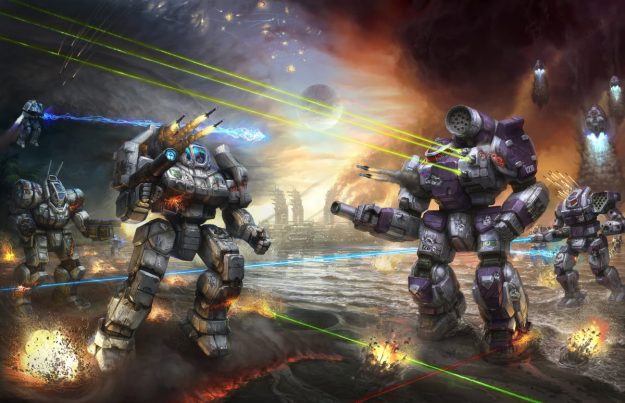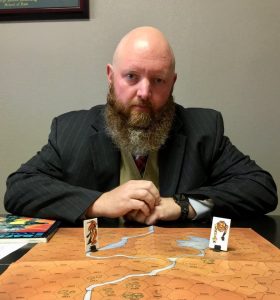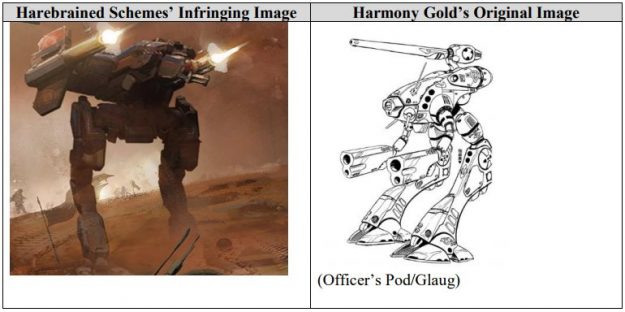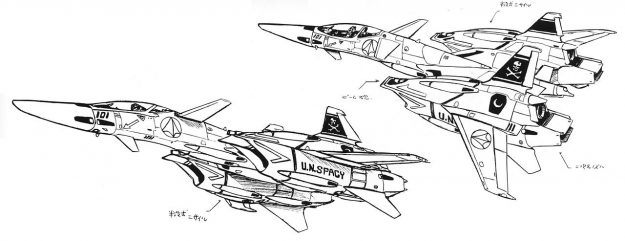There’s been a lot of speculation on the Harmony Gold v. BattleTech lawsuit, and I’m sorry to say some of that speculation may have come from this very publication. Previous articles from yours truly may have made it seem like the ongoing lawsuit is on its last legs and that we were all moments away from our triumphant victory.
That may have been more wishful thinking on my part, as it turns out. But, rather than me preface every article with the now-standard “I’m not a lawyer, but”, we’ve reached out to an ACTUAL lawyer to get his professional two cents.
Let me introduce you all to Robert Spendlove, an intellectual property lawyer and partner at the law firm of Laubscher, Spendlove & Laubscher. In his own words, Robert “has worked extensively in the gaming and toy industry, for and against such companies as Nintendo, Zuru, Disney, Turbine, and Sony.”
But more importantly, Robert is also a huge BattleTech nerd with over thirty years of losing countless hours to various iterations of the franchise on either tabletop or personal computer. This guy knows two things: BattleTech and IP law, and he’s also pretty damned good at explaining the two.
So good, in fact, that he wrote a big long essay on the current state of the lawsuit that I just couldn’t bear to slice and condense. Thus, to correct my own mistakes and give us all a unique insight into what’s going on, I present to you Robert’s take. Enjoy!
Everyone hates lawyers but loves watching a good legal fight. I guess we are kind of like the Kardashians that way. And the BattleTech/Harmony Gold saga has provided years of… well, I don’t think entertainment is the right word, but “interesting viewing,” maybe? The latest case, styled Harmony Gold U.S.A. Inc. v. Piranha Games Inc. et al., is currently pending in the United States District Court for the Western District of Washington. It might be helpful to provide a brief overview of what Harmony Gold has to prove, what the two sides are really arguing about right now, and where the case might go from here.
Unfortunately, that means talking a little bit about the requirements of copyright law and the history of BattleTech. I’ll be as concise as I can; try not to let your eyes glaze over.
A little timeline to keep the players straight:
- 1981 – Studio Nue and Big West create the original character artwork.
- 1982 – Tatsunoko assists with the animation for the Macross motion picture and as compensation receives overseas commercialization rights for the completed Macross.
- 1984 – Tatsunoko grants Harmony Gold an exclusive license to adapt and commercialize the Macross motion picture in the United States.
- 1984 – L. Ross Babcock and Jordan Weisman, co-founders of FASA Corporation, find surplus models based on Macross at a hobby industry show and use them in developing the game that eventually became BattleTech.
- 1985 – Harmony Gold files a U.S. copyright registration for the Macross motion picture.
- 2002 – Big West files U.S. copyright registrations for the original character artwork.
The case deals with the defendants’ (Piranha, Harebrained, and InMediaRes/Catalyst Games) use of the original character artwork. To get my biases out of the way, I think that every BattleTech game should use the original Marauder artwork, but it’s not my job to be the good news fairy. So, let’s talk about proving a copyright case.
In order to prevail, the plaintiff (Harmony Gold) must prove two things: (1) that it owns a valid copyright in an original work, and (2) that the defendants (Piranha and others) copied the original work. The question of copyright ownership comes first. If you don’t own the copyright, it doesn’t matter if the defendants copied. And, to make things more complicated, you can split up copyright ownership into pieces; lawyers often use the analogy of a bundle of sticks. A copyright owner can transfer the entire bundle or break it apart into separate sticks. For example, DC Comics could license someone to make a movie featuring the Batmobile while retaining the right to sell merchandise based on the Batmobile. That’s the current issue before the court.
Piranha has filed a motion for summary judgment, essentially asking the Court to throw out the case because Harmony Gold does not own the copyright to the original characters. Piranha argues that Big West only gave Tatsunoko a license to the Macross Motion Picture and not to the original character artwork. This would mean that Tatsunoko could not license the copyright to Harmony Gold because it never owned the copyright in the first place. Piranha’s position has merit. Prior litigation and arbitration between Harmony Gold, Tatsunoko, and Big West suggest that Tatsunoko did not acquire copyright in the original artwork, which resulted in Big West separately registering copyrights in 2002.
So, that’s it, right? Big West never licensed the original character artwork to Tatsunoko. Therefore, Tatsunoko couldn’t license it to Harmony Gold, and Harmony Gold has no standing to bring the case—game over. Not so fast. It isn’t that straightforward; it never is.
First, Harmony Gold argues that it did get the copyright to the original characters because Big West gave Tatsunoko exclusive rights to the Macross movie, including the right to merchandise the characters. And the right to merchandise the characters includes the right to exclude others from merchandising the characters. In addition, an outside party cannot challenge the transfer of rights if the original owner concedes the transfer. Harmony Gold claims that Big West doesn’t challenge the transfer, so Piranha cannot either.
I would be surprised if the judge ruled in Piranha’s favor on the summary judgment motion.
More importantly, at this stage of the litigation, Piranha has asked the judge to dismiss the case on summary judgment. A case can only be decided on summary judgment if one party will prevail “as a matter of law.” When applying this standard, the judge assumes all disputed facts and inferences in favor of the non-moving party. What does that mean in this case? In order to keep the case moving forward, Harmony Gold does not have to prove that it has a license to the copyright, it just has to raise enough evidence to show that there is a genuine issue for trial.
In my experience, federal judges are very reluctant to decide a case on summary judgment if there are non-crazy arguments on both sides. Here, Piranha may eventually prevail, but Harmony Gold’s arguments don’t strike me as frivolous. I would be surprised if the judge ruled in Piranha’s favor on the summary judgment motion. I fully expect the judge to concede that there are unresolved issues and allow the case to proceed through the discovery process and trial, which would include investigation and arguments about the alleged copying as well as ownership issues. The trial is currently scheduled for February 4, 2019.
If Piranha can win now, they will save millions versus going all the way through trial.
So, the case looks to be around for a while even if there aren’t any other delays.
Why would Piranha file this motion? First and foremost, their arguments are reasonable, and they may convince the judge. I don’t expect the judge to grant summary judgment, but I’m not the one wearing the black dress. If Piranha can win now, they will save millions versus going all the way through trial.
The motion may also provide leverage if there is any chance the parties might reach an agreement. Harmony Gold now faces the possibility a judge will decide that they have no rights to the original characters. Harmony Gold may be willing to make some compromises rather than risk losing everything.
If Piranha prevails on the summary judgment, are they free and clear? No. Big West would still own the copyright, and Piranha would have to reach an agreement with them or face the possibility of litigation with Big West on the second prong—whether Piranha is actually copying the original characters.
Harebrained and Harmony Gold almost certainly reached an agreement.
What about Harebrained Schemes and the recently launched BattleTech game? On April 9, 2018, Harebrained and Harmony Gold stipulated to a voluntary dismissal of the claims against Harebrained and Weisman. This dismissal was with prejudice, which means that Harmony Gold cannot re-file the same claims at a later date. Because the stipulation was a joint stipulation, Harebrained and Harmony Gold almost certainly reached an agreement. But we are unlikely to ever know the specifics of that agreement. Harebrained may have agreed to pay Harmony Gold some amount of money to go away. Harebrained may just have agreed not to use the original character artwork. We won’t know until they show up in the game–or not.
My guess? This dismissal was highly influenced by the fact that Harmony Gold’s copying claims against Harebrained are much weaker than against Piranha. Harmony Gold’s complaint against Harebrained alleges that a Locust is a copy of a Marauder and an Atlas is a copy of a Crusader. Quite apart from the ownership issue, this seems like an uphill battle to me.
And Catalyst Game Labs? InMediaRes, the owner of Catalyst Game Labs, failed to respond to the lawsuit and an order of default was entered on June 28, 2017. This means Catalyst cannot mount any defense to the allegations, but a hearing will still need to be held regarding what damages the court will award. If Piranha succeeds in proving that Harmony Gold does not have standing because it doesn’t own the copyright, then Catalyst would likely be able to have the default set aside.
If Piranha succeeds in proving that Harmony Gold does not have standing because it doesn’t own the copyright, then Catalyst would likely be able to have the default set aside.
For those craving more legal arcana, it might be interesting to look at a tactical (versus strategic) dispute currently before the court.
Harmony Gold requested that the U.S. court issue a request for international judicial assistance, known as a letter rogatory, to the judicial authority of Japan. Harmony Gold is looking for documents from Big West and claims that the letter rogatory represents a legitimate investigation. In contrast, Piranha contends that it will only create confusion and cause delay.
To understand the competing positions, it helps to understand a little about how cases typically proceed and the difficulties when things get international.
Litigation generally includes two phases: a discovery phase and a trial phase. The trial phase is what you see on TV; the discovery phase is longer and more boring. During the discovery phase, the parties are required to give each other certain information, often including producing documents, conducting witness depositions, and answering written questions. The goal is for both sides to have all the “facts” so that the jury can hear the evidence with no surprises at trial.
The standard for what information must be produced is very broad: “any nonprivileged matter that is relevant to any party’s claim or defense.” The parties can also request information from third-parties, which are required to produce the information within reasonable limits. Harmony Gold is asking Big West to produce documents relating to agreements and communications with Studio Nue and Tatsunoko. These documents, if any exist, almost certainly fall within the broad scope of being “relevant.”
So, what is the problem? Within the United States, the federal court could compel a recalcitrant third-party to produce the documents, but Big West is not a U.S. company. The U.S. courts have no authority over it. In order to force Big West to turn over documents, Harmony Gold has to go through procedural hoops governed by international treaty in which the U.S. court issues a request, which gets forwarded to the appropriate Japanese judicial authority, which in turn, if it agrees the request is appropriate, orders Big West to produce the documents.
Piranha contends that the entire litigation is unnecessary because by law Harmony Gold does not own copyrights to the original character artwork.
As you can imagine, this is a drawn out, if typically mundane, process.
Why then is it controversial here? Remember where we are in the case from our discussion above. Piranha contends that the entire litigation is unnecessary because by law Harmony Gold does not own copyrights to the original character artwork. Harmony Gold wants to win the war but must first win this battle.
The letter rogatory process often takes a year or more. If Harmony Gold can convince the court that Big West has critical information worth waiting for, it has as good as won the summary judgment argument. Not surprisingly, Piranha thinks this is all just to waste time, arguing that Harmony Gold should already have the relevant documents from its licensor, Tatsunoko, or at the very least should have started this process back when it filed the lawsuit on March 1, 2017.
Thank you, Robert, for giving us all a thorough understanding of where we’re at in this latest legal attack on our beloved fictional universe. As much as I want the courts to toss Harmony Gold out on their ass, wishing for the thing doth not make it so.
As for what happens next, we might hear back from that letter rogatory in the coming months, or we might not hear anything until the trial starts next year. Whatever happens, we’ll be sure to keep everyone in the loop.
And as always, MechWarriors: Stay Syrupy.









Thank you for this article.
Very informative – and it’s also good to read a lawyer’s qualified impression of the state of affairs without the wishful-thinking-glasses on, even if that means HG’s lawsuit isn’t as dead in the water just yet as the BT fans want to believe.
To wit, I think it would actually be preferrable for PGI to win on the merits of the case, instead of a technical win because of HG’s lack of standing. Personally, I also firmly believe that the case is without merit. But the longer it takes to conclude, the higher the risk that HG can coerce the defendants into some kind of settlement that gives HG more than they legally deserve.
I’d ove to see HG lose and lose a counter suit for million for this. HG has run around bullying this franchise for too long and I would DEARLY love to see them BURIED in court
Obligatory: I am not a lawyer or trained/learned in law in any way. Therefore, you’re an idiot if you treat anything I’m saying here as if it came from a lawyer or as if it were legal advice (suppresses vicious rant about our legal system and societal castes to save space).
[blockquote]First, Harmony Gold argues that it did get the copyright to the original characters because Big West gave Tatsunoko exclusive rights to the Macross movie, including the right to merchandise the characters. [/blockquote]
This makes me wonder: (and this would be what I’d ask Mr. spendlove his *opinion* about) Did tatsu ever possess the rights that HG claims tatsu transferred to them, especially in light of what the 2000’s era cases in japan exposed? I am not saying they did or didn’t. I’m simply asking, did they?
This would seem a question important enough to moot very carefully, specifically to suss out how tatsu’s non-ownership of the 41 likenesses might be involved.
Are the rights of the 41 likenesses separable from the rights being claimed? As much as john q. public would say “how in the WORLD could the not be?” I perceive the legal system as being anything BUT intuitive.
[blockquote] In addition, an outside party cannot challenge the transfer of rights if the original owner concedes the transfer. Harmony Gold claims that Big West doesn’t challenge the transfer, so Piranha cannot either.[/blockquote]
Smacks of adverse possession, aka, legal way to steal from people. <— that's not my legal opinion, that's my moral conviction (I believe it's an absolute moral truth) about adverse "possession."
… and it seems I'm not the only one thinking about copyright/IP and adverse possession:
http://jolt.law.harvard.edu/articles/pdf/v16/16HarvJLTech327.pdf
http://digitalcommons.lmu.edu/cgi/viewcontent.cgi?article=1251&context=elr
Just to note, where the lawyer refers to “the Macross movie,” I think he’s actually referring to the Macross TV show. There was a Macross movie, but it wasn’t actually directly connected or related to Robotech or BattleTech, and I don’t believe Harmony Gold ever actually had any rights to it.
I was thinking the same thing.
‘Robotech,’ aka ‘the only reason Harmony Gold is relevant’ used licensed footage from the Macross TV series. The differentiation in licensing between the Macross TV series (aka Super-Dimension Fortress Macross) and the Macross movie (aka Macross: Do You Remember Love) is what allowed certain distributors to get away with models and figures of Macross mecha, as long as they were based on the DYRL designs specifically (like the VF-1S Strike Valkyrie, aka the Phoenix Hawk LAM with two guns on the right jetpack).
Harmony Gold does not have and has never had access to the footage or models from DYRL, and AFAIK, Battletech has never used those specific models either. DYRL is, I believe, irrelevant to the current legal discussion except as an interesting footnote for those looking for loopholes to make transforming VF toys.
Could the fact that they boneheadedly thought Atlas = whatever the Crusader’s original art was ripped from in Macross and Locust = Likewise for Marauder’s in the case against Harebrained Schemes be used against them in the Pirahna Games showdown? Or the fact that they missed several other formerly Unseen mechs in the mech lineup in HBS BattleTech?
It shouldn’t have any effect. They sue PGI for certain claims and HBS was part of it due different claims. They have only sued for Macross related Unseen mechs that were created to day of last amendment because these are the only ones to which they have possible claim (Tatsunoko agreement). But if HBS introduces Macross related Unseen mechs they can sue them for it.
Youtuber law goes over this case in some youtube videos which are very informative. I recommend that you watch them.
What you tuber law basically said (as I remember it) was that harmony gold doesn’t have the liscence to the original works, only a derivative. He described it as having the rights to produce a version of Captain America toy with all black. Using this example he says that if you were hasbro and had the liscence to the all black captain America toy you can’t sue someone else (say mattel) who is making original captain America toys. Both you and mattel would have gotten your liscences from the original source, in this example marvel comics. The way he read the case Harmony gold has the rights to make a macross TV show here in the USA. Following his read and logic there would therefore be no case for harmony gold to sue over the making of different variations of the same design, as they only have rights to one derivative. I might have heard what I wanted to hear from his video but that’s what I got from it. I agree with Aaron it’s a good listen.
I still hold out some hope for a summary judgement, but not enough to put money on it. While it is true that the judge has to give the plaintiff the benefit of the doubt in regards to the complaint they made, that doesn’t mean they must accept that a bare claim is true without any appropriate supporting documentation.
Specifically, I believe the judge does NOT have to assume that the copyright registration says something other than what is on its face. It isn’t a registration for the characters, which is what Big West field several years later. It is a registration for a motion picture, a specific embodiment. I feel it is entirely appropriate for PGI to argue ‘they are suing us for X, but showing evidence of their right to Y.’ If they lack standing, summary judgement is entirely appropriate.
The Tatsunoko arbitration and the Big West copyright registration both speak plainly as to the status of who owns the characters, and the onus should still be on HG to produce something other than testimony from interested parties to prove that the plain language of those legal documents. Saying they have the legal standing to sue over derivative works of Macross characters when they can provide no documentation indicating they hold rights to those characters or the rights to exploit them, and indeed there are legal documents that directly contradict that claim, could still be sufficient.
Thank you!
THIS certainly provides a great deal of illumination on what has been at best a series of murky and muddled conjectures and opinions on the matter. I personally finally have a much clearer picture of what’s going on in this crazy train ride.
I do wonder, however, WHY Catalyst Game Labs never responded in this case? Is there anything that indicates if this was a deliberate choice, a legal tactic, or just a careless error?
I just caught one thing that is completely irrelevant to.the.subject of the article but still somewhat relevant to the topic.
That iconic macros spaceship mech, isn’t that is basically a “copyright infringement” against the Northrop Grumman F-14 Tomcat and the famous squadron of the US Navy that has the similar tail marking? Lol.
Wonder if real world military or even any kind of vehicle manufacturer ever sued fiction writers/producers over fictional vehicles that are similar to the real ones, lol?
Not that I know of but GM did sue Activision over use of the hummer in it’s games. https://www.rockpapershotgun.com/2017/11/09/humvee-manufacturer-suing-activision-over-call-of-duty-vehicles/
Northrop Grumman maybe, but VFA-103 “the Jolly Rogers” as a government agency can’t own a copyright.